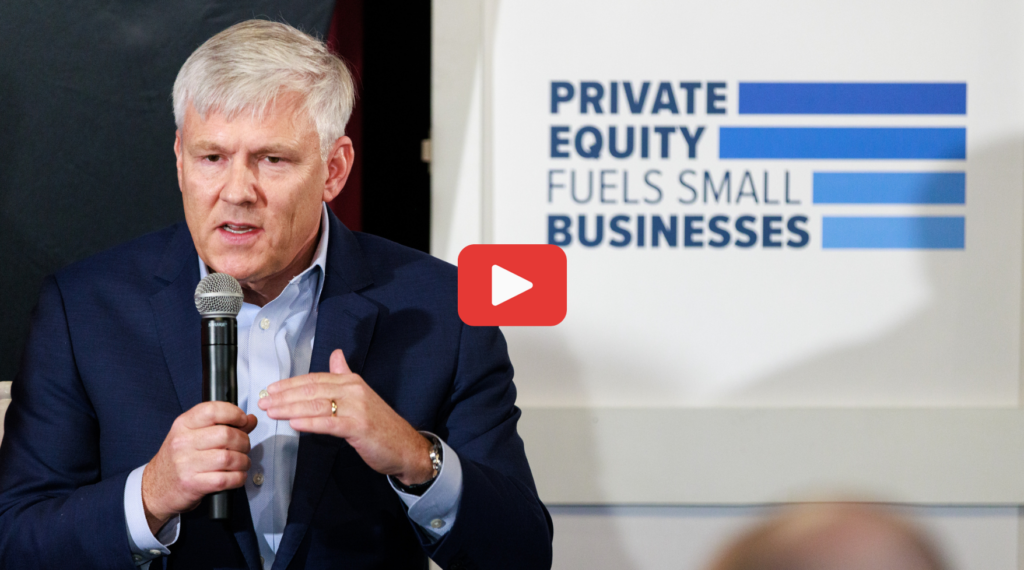ICYMI: CBC Chair Steven Horsford (D-NV) and AIC President Drew Maloney Highlight Private Equity’s Critical Investments in Small Business

WASHINGTON, D.C. – Punchbowl News recently hosted an event sponsored by the American Investment Council examining how private equity supports local economies by investing in small businesses. In 2022, 85 percent of all private equity investments went to support small businesses with fewer than 500 employees. The event featured a conversation with Punchbowl News Founder Anna Palmer and U.S. Congressman and Chair of the Congressional Black Caucus (CBC) Steven Horsford (D-NV). American Investment Council President & CEO Drew Maloney then joined Palmer for a fireside chat, providing further insights into how private equity investments help entrepreneurs grow their businesses.
Private Equity Supports Businesses Across Nevada

Private equity-backed companies support more than 8,400 jobs in Rep. Horsford’s Nevada district. Across Nevada, private equity-backed companies employ 112,000 workers and invested more than $20.7 billion in 2022. Rep. Horsford (D-NV) discussed how all businesses, ranging from small businesses to major Las Vegas hotels, have benefitted from private equity, “I recognize the role that private equity and private capital plays in this moment, particularly with the tightening of access to credit with the increase of interest rates,” he said.
SEC Chair Gensler’s Regulations are Impacting “Minority” and “Mom and Pop Businesses”

Rep. Horsford also discussed how Securities & Exchange Commission (SEC) Chair Gary Gensler’s regulations will have unintended consequences on “minority” and “mom and pop businesses.” “[The SEC] may be thinking they’re going after this level of an industry, but meanwhile, they’re impacting the mom and pop in my district, the business in rural Nevada that’s just trying to get $100,000 to payroll, and a new startup that has a dream and an idea and an opportunity but can’t do it without access to capital.”
SEC’s Private Funds Adviser Rule Impacts Small Businesses and Women & Minority Owned Funds

Rep. Horsford also discussed how the SEC’s Private Funds Advisor Rule would undermine efforts to increase access to capital for small businesses, particularly investments from minority and women-owned firms, “I talked to the White House, to the President, to the Vice President, to their economic advisers, to explain that we cannot achieve economic mobility and wealth and legacy and close the wealth gap if we have policy or regulations that are quelching our ability to do that, and in my view, the regulation in this case, is a quelching effect on access to capital,” he said.
Private Equity Primary Supports Small Businesses

AIC President & CEO Drew Maloney discussed how 85 percent of private equity investments go to small businesses with 500 employees or less. “The actual median size of a private equity investment is a small business with 69 employees … The other advantage is the average wage for a private equity backed portfolio company is $80,000 a year. So, they’re well-paid jobs. They’re investing in communities across America,” he said.
Private Equity Supported Sweetgreen and CAVA

Maloney then discussed how Sweetgreen and CAVA have built beloved brands thanks to support from private equity. “The idea behind Sweetgreen is you had two Georgetown students who were complaining that all they had was unhealthy food options living on campus … They invested in a little storefront and they converted it into Sweetgreen … now at some point they wanted to grow that business, and they knew that they couldn’t do it with their own capital, so they partnered with private capital to do that … it’s now publicly traded and it’s more than a billion-dollar company,” he said.
Small Businesses Can Access Financing Directly from Private Credit

Maloney concluded by discussing how private credit has become a valuable alternative to traditional lending from banks for small- to medium-sized businesses. “People still needed access to capital. People still needed mortgages. People still needed car loans. So, [the Dodd-Frank Act] created an environment where you had to go outside of the normal accesses to capital to get it and that’s what we do is we provide a lot of these businesses that may be too risky for a bank to take on with capital,” he said. The AIC represents about two thirds of all private credit assets in America.
Click here to view the full event.


